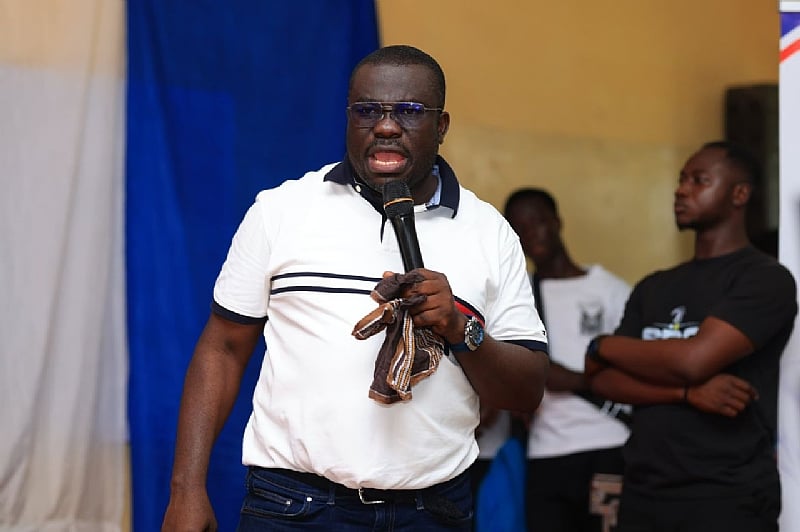The arrest and subsequent detention of Kwame Baffoe, also known as Abronye, the Bono Regional Chairman of the New Patriotic Party (NPP), has ignited a firestorm of criticism against the John Dramani Mahama administration, with accusations of political persecution and selective justice taking center stage. Former Member of Parliament for Dormaa East, Paul Twum-Barimah, has vehemently condemned the actions of the security agencies, characterizing them as a targeted harassment campaign against political opponents. He argues that this pattern of arrests and detentions undermines the very foundations of Ghana’s democratic principles and tarnishes the nation’s reputation as a beacon of stability and freedom in the region. Twum-Barimah’s pointed critique directly calls upon President Mahama to intervene and rein in the security apparatus, demanding an end to what he perceives as a deliberate attempt to silence dissenting voices.
The core of the controversy lies in the perceived disparity in the treatment of legal cases involving individuals aligned with opposing political factions. Twum-Barimah highlights the stark contrast between the handling of Abronye’s case, where he was remanded into custody for what he terms a “misdemeanor,” and the leniency afforded to individuals convicted of physically assaulting former MP Hawa Koomson and the NPP’s Deputy National Organizer. The latter were granted post-conviction bail, raising questions about the impartiality and objectivity of the judicial process. This perceived double standard, according to Twum-Barimah, underscores a disturbing trend of politically motivated prosecutions designed to intimidate and suppress opposition voices. He contends that the Mahama administration is manipulating the legal system to its advantage, creating an environment of fear and silencing dissent under the guise of upholding law and order.
Twum-Barimah’s condemnation goes beyond mere criticism of individual incidents; it paints a broader picture of a systematic erosion of democratic values under the Mahama administration. He argues that the arbitrary arrest and detention of political opponents are not isolated events but rather indicative of a calculated strategy to stifle free speech and political dissent. He sees the actions of the security services as a deliberate attempt to create an atmosphere of fear and intimidation, thereby discouraging open criticism of the government and hindering the free exchange of ideas essential for a healthy democracy. This, he warns, poses a grave threat to Ghana’s democratic gains and risks undermining the hard-won freedoms that have been the cornerstone of the nation’s progress.
The selective application of justice, exemplified by the contrasting treatment of Abronye and those involved in the physical assault of NPP officials, raises serious concerns about the integrity of the legal system. Twum-Barimah’s assertion that Abronye’s detention for a misdemeanor while those convicted of violent acts are granted bail highlights a blatant disregard for the principle of equal application of the law. This perceived bias fuels suspicions of political manipulation within the judiciary and reinforces the narrative of a government using the legal system as a tool to suppress dissent and maintain its grip on power. Such actions, if left unchecked, can erode public trust in the judicial process and create a climate of impunity, where individuals aligned with the ruling party feel emboldened to act outside the law.
The implications of these actions extend beyond the immediate cases and touch upon the broader political landscape of Ghana. Twum-Barimah’s direct appeal to President Mahama to intervene reflects a growing concern that the unchecked actions of the security agencies are not only eroding democratic norms but also contributing to a climate of political instability. By targeting political opponents and silencing dissenting voices, the government risks exacerbating existing tensions and creating a polarized environment where dialogue and compromise become increasingly difficult. This, in turn, can undermine the foundations of a stable and inclusive democracy, potentially leading to social unrest and further polarization.
The arrest and detention of Kwame Baffoe, therefore, serves as a focal point for a wider debate about the state of democracy and the rule of law in Ghana. Twum-Barimah’s call for President Mahama to intervene highlights the urgency of the situation and underscores the need for decisive action to protect the fundamental rights of all citizens, regardless of their political affiliations. The future of Ghana’s democracy hinges on the government’s willingness to uphold the principles of justice, fairness, and respect for the rule of law. Failure to do so risks jeopardizing the nation’s hard-won democratic gains and setting a dangerous precedent for the suppression of political dissent across the region.














